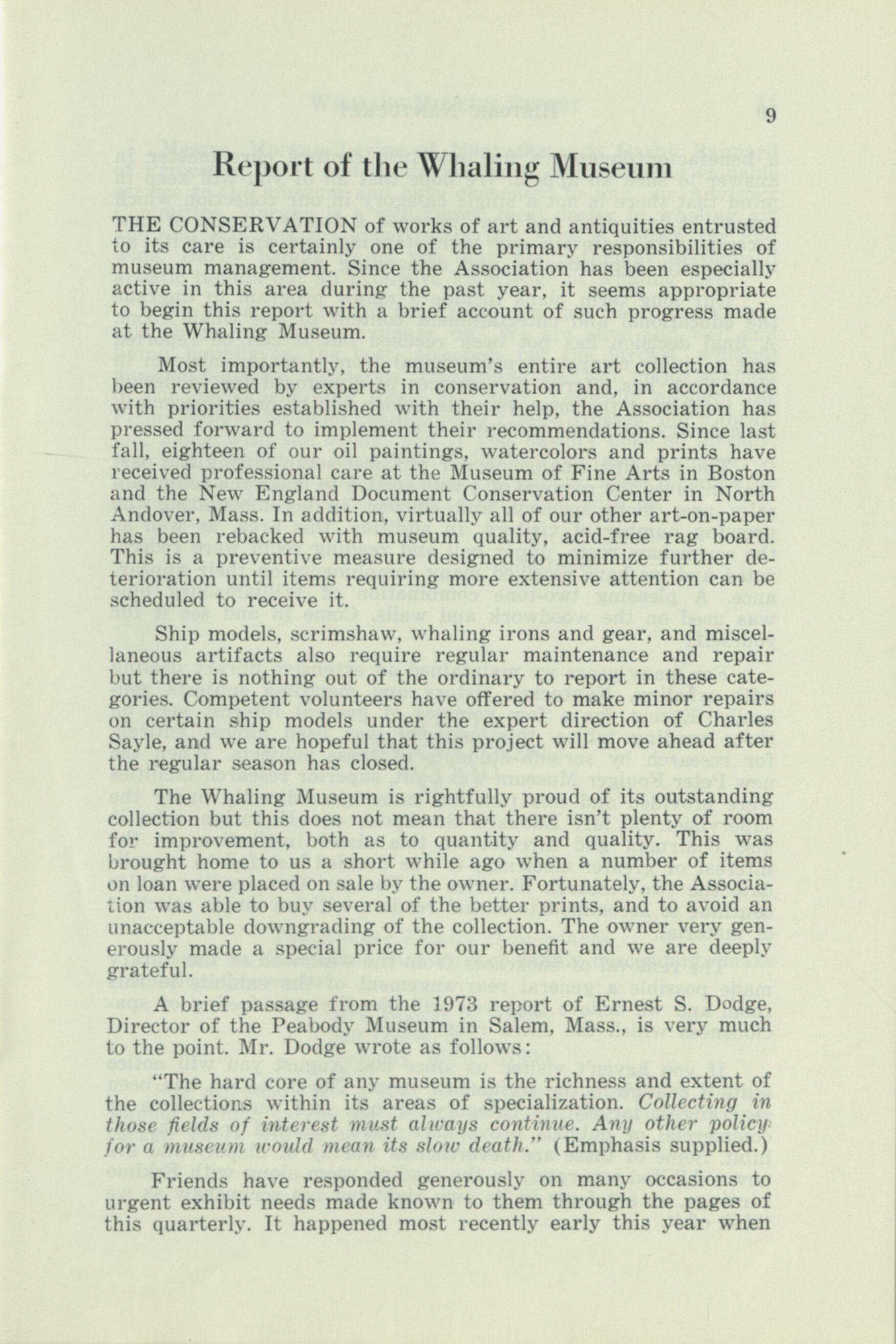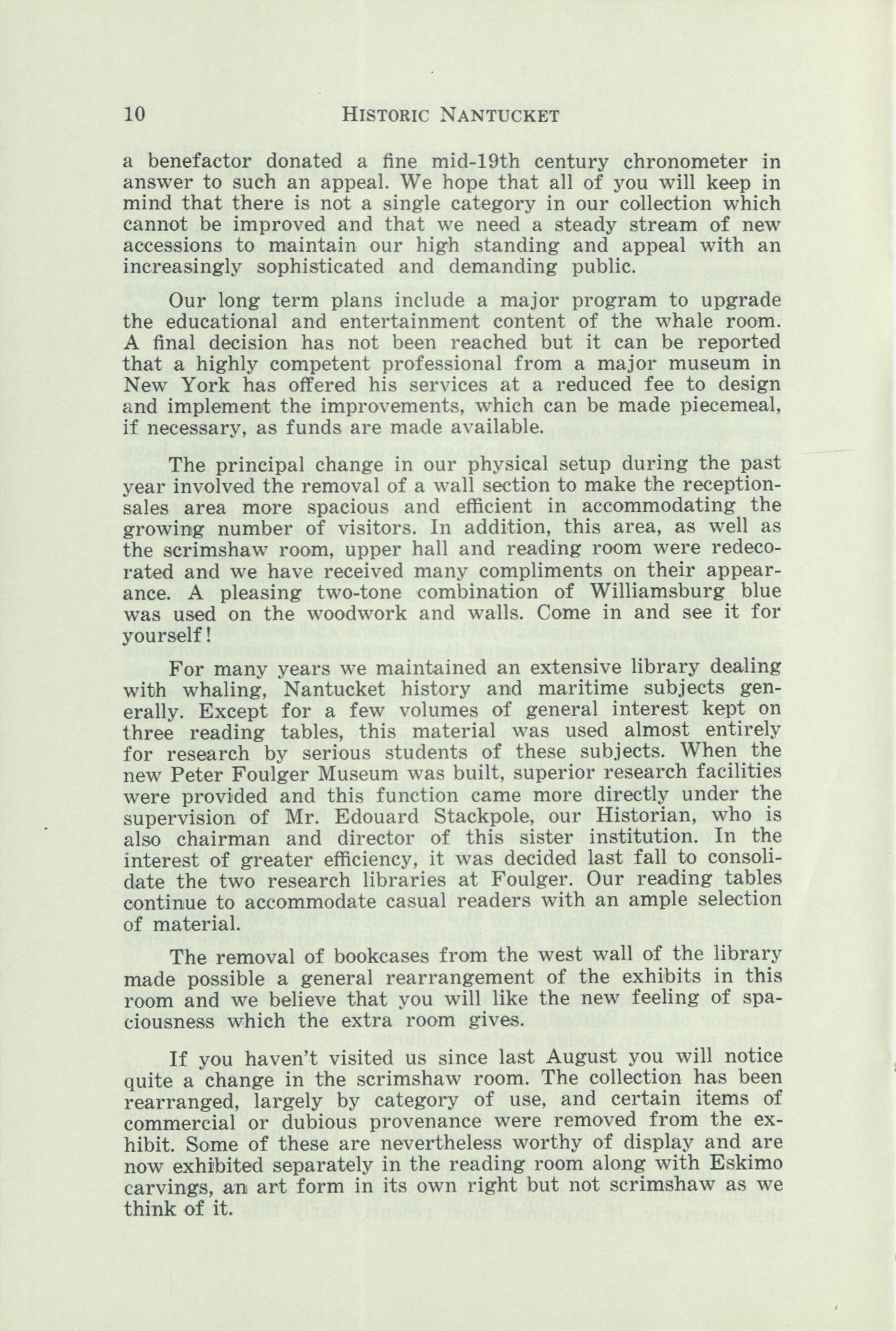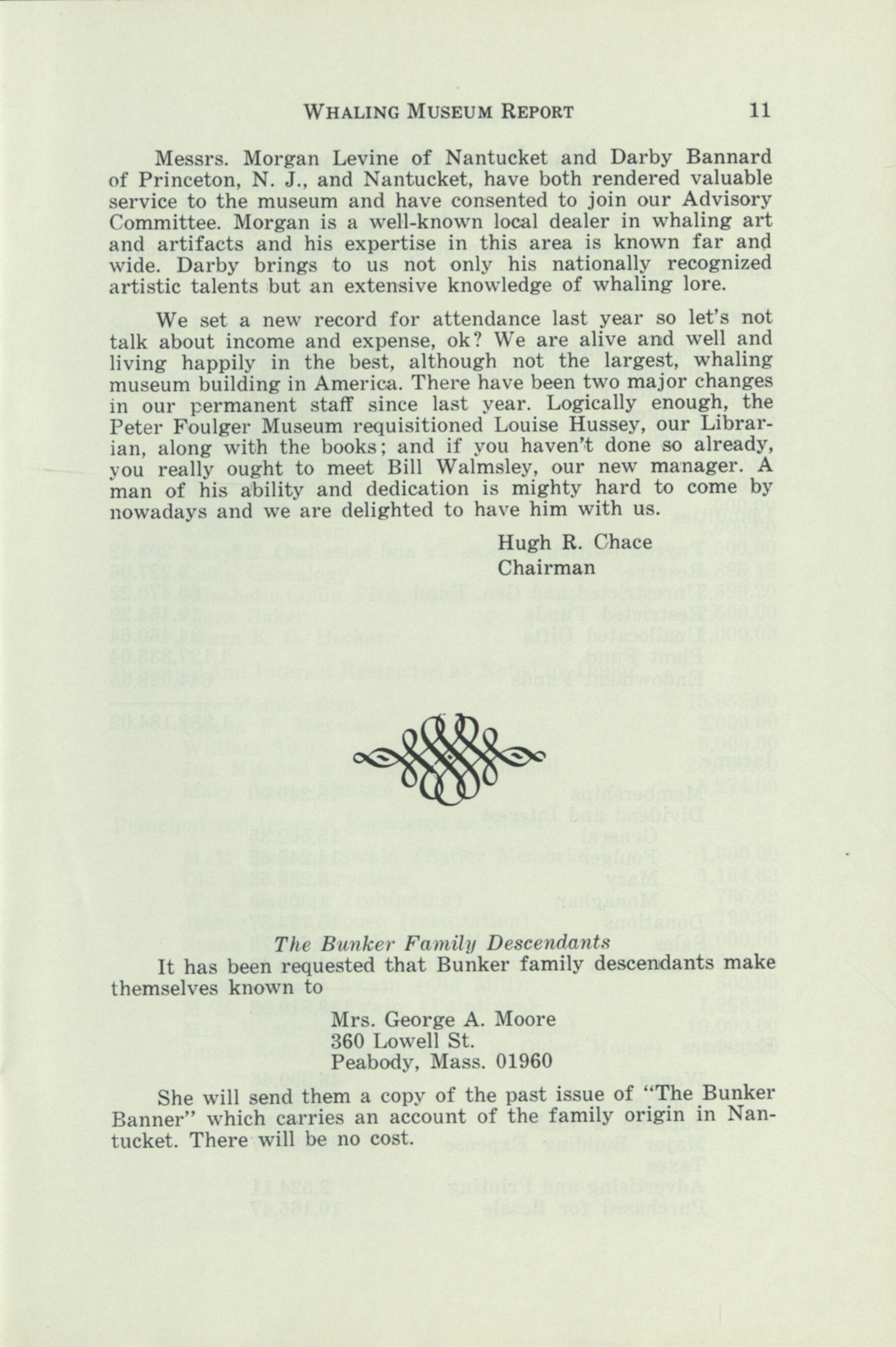
5 minute read
Report of the Whaling Museum
THE CONSERVATION of works of art and antiquities entrusted to its care is certainly one of the primary responsibilities of museum management. Since the Association has been especially active in this area during the past year, it seems appropriate to begin this report with a brief account of such progress made at the Whaling Museum.
Most importantly, the museum's entire art collection has been reviewed by experts in conservation and, in accordance with priorities established with their help, the Association has pressed forward to implement their recommendations. Since last fall, eighteen of our oil paintings, watercolors and prints have received professional care at the Museum of Fine Arts in Boston and the New England Document Conservation Center in North Andover, Mass. In addition, virtually all of our other art-on-paper has been rebacked with museum quality, acid-free rag board. This is a preventive measure designed to minimize further deterioration until items requiring more extensive attention can be scheduled to receive it.
Ship models, scrimshaw, whaling irons and gear, and miscellaneous artifacts also require regular maintenance and repair but there is nothing out of the ordinary to report in these categories. Competent volunteers have offered to make minor repairs on certain ship models under the expert direction of Charles Sayle, and we are hopeful that this project will move ahead after the regular season has closed.
The Whaling Museum is rightfully proud of its outstanding collection but this does not mean that there isn't plenty of room for improvement, both as to quantity and quality. This was brought home to us a short while ago when a number of items on loan were placed on sale by the owner. Fortunately, the Association was able to buy several of the better prints, and to avoid an unacceptable downgrading of the collection. The owner very generously made a special price for our benefit and we are deeply grateful.
A brief passage from the 1973 report of Ernest S. Dodge, Director of the Peabody Museum in Salem, Mass., is very much to the point. Mr. Dodge wrote as follows: "The hard core of any museum is the richness and extent of the collections within its areas of specialization. Collecting in those fields of interest must always continue. Any other policyfor a museum ivould mean its slow death." (Emphasis supplied.)
Friends have responded generously on many occasions to urgent exhibit needs made known to them through the pages of this quarterly. It happened most recently early this year when
10
HISTORIC NANTUCKET
a benefactor donated a fine mid-19th century chronometer in answer to such an appeal. We hope that all of you will keep in mind that there is not a single category in our collection which cannot be improved and that we need a steady stream of new accessions to maintain our high standing and appeal with an increasingly sophisticated and demanding public.
Our long term plans include a major program to upgrade the educational and entertainment content of the whale room. A final decision has not been reached but it can be reported that a highly competent professional from a major museum in New York has offered his services at a reduced fee to design and implement the improvements, which can be made piecemeal, if necessary, as funds are made available.
The principal change in our physical setup during the past year involved the removal of a wall section to make the receptionsales area more spacious and efficient in accommodating the growing number of visitors. In addition, this area, as well as the scrimshaw room, upper hall and reading room were redecorated and we have received many compliments on their appearance. A pleasing two-tone combination of Williamsburg blue was used on the woodwork and walls. Come in and see it for yourself!
For many years we maintained an extensive library dealing with whaling, Nantucket history and maritime subjects generally. Except for a few volumes of general interest kept on three reading tables, this material was used almost entirely for research by serious students of these subjects. When the new Peter Foulger Museum was built, superior research facilities were provided and this function came more directly under the supervision of Mr. Edouard Stackpole, our Historian, who is also chairman and director of this sister institution. In the interest of greater efficiency, it was decided last fall to consolidate the two research libraries at Foulger. Our reading tables continue to accommodate casual readers with an ample selection of material.
The removal of bookcases from the west wall of the library made possible a general rearrangement of the exhibits in this room and we believe that you will like the new feeling of spaciousness which the extra room gives.
If you haven't visited us since last August you will notice quite a change in the scrimshaw room. The collection has been rearranged, largely by category of use, and certain items of commercial or dubious provenance were removed from the exhibit. Some of these are nevertheless worthy of display and are now exhibited separately in the reading room along with Eskimo carvings, an art form in its own right but not scrimshaw as we think of it.

WHALING MUSEUM REPORT
11
Messrs. Morgan Levine of Nantucket and Darby Bannard of Princeton, N. J., and Nantucket, have both rendered valuable service to the museum and have consented to join our Advisory Committee. Morgan is a well-known local dealer in whaling art and artifacts and his expertise in this area is known far and wide. Darby brings to us not only his nationally recognized artistic talents but an extensive knowledge of whaling lore.
We set a new record for attendance last year so let's not talk about income and expense, ok? We are alive and well and living happily in the best, although not the largest, whaling museum building in America. There have been two major changes in our permanent staff since last year. Logically enough, the Peter Foulger Museum requisitioned Louise Hussey, our Librarian, along with the books; and if you haven't done so already, you really ought to meet Bill Walmsley, our new manager. A 'man of his ability and dedication is mighty hard to come by nowadays and we are delighted to have him with us. Hugh R. Chace Chairman
The Bunker Family Descendants
It has been requested that Bunker family descendants make themselves known to

Mrs. George A. Moore 360 Lowell St. Peabody, Mass. 01960
She will send them a copy of the past issue of "The Bunker Banner" which carries an account of the family origin in Nantucket. There will be no cost.








